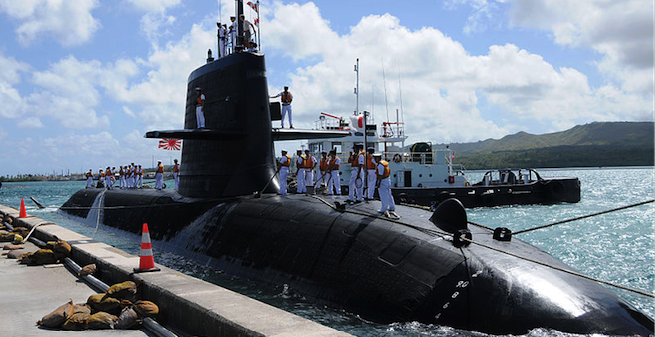Australia’s Submarine Purchase: an Unnecessary Snub to Japan

With Australia’s recent decision on submarine design, the flawed regional politics tainted a technically right outcome. Choosing the French bidder has significant implications, particularly for Australia’s relations with Japan in the long term.
There were many considerations behind the decision to award the contract for Australia’s 12 future submarines to France’s DCNS. All are legitimate and proper, although not of equal weight. Mega-expenditure decisions being shaped by electoral calculations is an unavoidable price of democracy. An industrial policy of maintaining manufacturing capacity, paying a premium for home-based jobs and defence self-reliance could also pre-empt social unrest and political perils down the line.
If we grant two key assumptions and dismiss Japanese sensibilities, the French bid may well be the best suited to Australia’s distinctive requirements. However, on reflection, that is a very big three-part ‘if’.
First, the case for Australia needing the submarines has been asserted but not proven. Governments are required to make tough calls on budgetary allocations to competing policy priorities; no sector enjoys absolute priority over all others. In a highly competitive fiscal environment, with a yawning budget deficit and spending and revenue problems, committing $50 billion to one component of defence expenditure for the next several decades entails substantial opportunity costs.
Australia’s public and social services are decaying. Why should defence expenditure be privileged to defend against hypothetical future threats when investment is urgently needed for more affordable access to public health, education and transport at present? Foreign affairs has also suffered serial budget cuts, yet diplomacy is a more cost-effective contribution to reducing the likelihood of war than investing in costly weapons for fighting one. Might developments in missile and drone technology provide more efficient and cost-effective alternatives?
The second questionable assumption is the a priori rejection of nuclear-powered submarines with substantial advantages on range and continuous at sea operation in far-off contested waters. During the envisaged timeframe – the 2030s to 2060s – the most potent military threats to Australia will come from nuclear powers. Many would have preferred an off-the-shelf purchase of the US Virginia class nuclear-powered submarines, with earlier induction into service and significant cost savings. It seems especially absurd that the winning bid is a redesigned, scaled-down version of a nuclear-powered submarine. Are we paying more and delaying entry into service to retrofit an existing model into an inferior substitute?
Peter Jennings notes that Australia lacks nuclear engineers, safety infrastructure and training arrangements, as well as a relationship with the US nuclear system. This argument can be turned on its head. Australia has the world’s largest uranium reserves and is also the most geologically stable continent. If the opposition to all things nuclear is based on ideology, the sooner the taboo on debating various nuclear options is lifted – from mining to value-added processing and waste disposal – the better. Maybe none of the options are economically viable or technically feasible, but to rule them out based on closed minds seems perverse. If they are feasible, it makes sense to build the entire infrastructure of educational, engineering and other supporting parts of a viable nuclear future. According to Finland’s ambassador, the Finnish Radiation Safety Authority responsible for regulating the safety of nuclear power reactors is trusted by over 80 per cent of the public as a reliable source of information. This is significant when compared to the mere 30 per cent who trust Greenpeace (lower even than politicians at 33 per cent).
The most damning criticism of the decision is the shabby treatment of Tokyo and the long-term implications this holds for Australia’s place in the regional security order. For France and Germany the bid was essentially commercial, but for Japan it was a strategic one that fell down at the final hurdle on non-strategic arguments. Japan has a direct self-interested stake in Australia’s security that France and Germany do not. The original request by former Prime Minister Tony Abbott to Japanese Prime Minister Shinzo Abe to supply submarines to Australia may have been yet another bad captain’s pick. But once the request was made and Japan responded positively, Australia’s decision was trapped in “path dependence” and new “political facts on the ground” had been created. Thereafter, the other bids did not just have to be technically superior, their advantages just had to be compelling enough to offset the significant damage to bilateral relations and regional reputation.
To permit the export of military hardware, Abe reinterpreted Japan’s constitutional prohibitions radically. To accommodate Australia, the Soryu-class submarine would be lengthened by 6–8 metres to provide additional fuel and battery space for increased range and to fit the taller Australian crew. Now Abe has been left politically exposed. “The decision was deeply regrettable”, Defence Minister Gen Nakatani said. “We will ask Australia to explain why they didn’t pick our design”. Turnbull says he and Abe remain committed to “the special strategic partnership” and the “strong trilateral strategic engagement between Japan, Australia and the United States”.
This is not an example of a clash of civilisations but a gap in political cultures. I had critiqued Julia Gillard’s 2012 Asian Century paper for being transactional, an approach to relationship building that Asians generally find uncomfortable and offensive. The risk of substantial damage to relations with Japan has been best explained by Greg Sheridan, and also noted by Paul Dibb. Having to deal with two different prime ministers and three different defence ministers in Canberra over the course of the saga was also very unhelpful. Japan has been left bewildered, bruised, hurt and insulted.
The decision has also left a distinct impression in Japan, the Asia-Pacific and indeed China that Canberra was successfully intimidated by Beijing – deepened further by the unfortunate coincidence it was announced shortly after Turnbull’s visit to China. The submarine deal with Australia would have assisted Japan on its long and delicate path to becoming a normal country with a regional military role appropriate to its political and economic status. This includes all the training and cooperation that accompanies the sale of military hardware.
That was a principal attraction to Washington and a potential threat to China that made no secret of its opposition to Tokyo’s bid. Regardless of how misleading China’s and regional conclusions might be about Australia having bent to Beijing’s pressure, others will recalibrate policies based on the perception.
Professor Ramesh Thakur is the director of the Centre for Nuclear Non-Proliferation and Disarmament at Crawford School of Public Policy at the Australian National University. This article is published under a Creative Commons Licence and may be republished with attribution.





